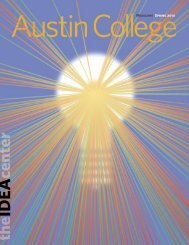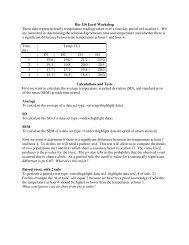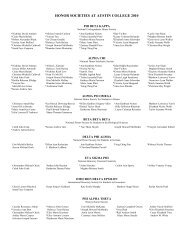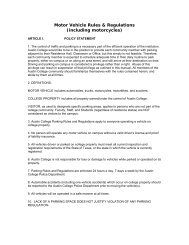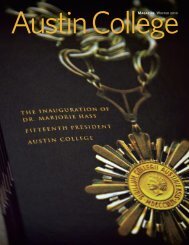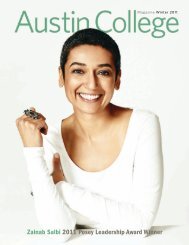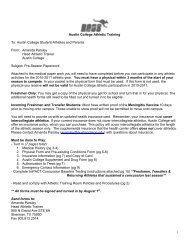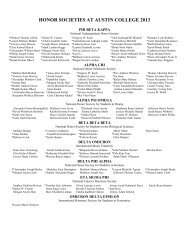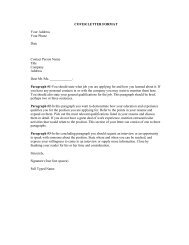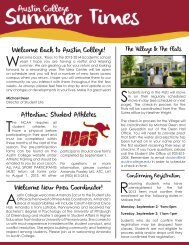You also want an ePaper? Increase the reach of your titles
YUMPU automatically turns print PDFs into web optimized ePapers that Google loves.
MATHEMATICS AND COMPUTER SCIENCE120 Elementary StatisticsAn introduction to principles and methods ofexperimental statistics. This course includesdiscussion of basic probability theory and focuseson its application to standard inferentialmethods. (Each fall and spring)141 Discrete MathematicsAn introduction to sets, relations, functions,graph theory, Boolean algebras, combinatorics,logic and logic circuits. This course is designedfor the general student. It is required for advancedstudy in computer science. (Each fall)151 Calculus IThe first course in the Calculus sequence. Includedis an introduction to the differential andintegral calculus of the elementary (algebraic,trigonometric, exponential and logarithmic) functionsof a single real variable, the FundamentalTheorem of Calculus, and various applications.The central role of the limit concept is stressedthroughout. Prerequisite: a high school or collegecourse in precalculus. (Each fall and spring)152 Calculus IIThe second course in the Calculus sequence.Expounding on the first semester, the course includesthe study of curves defined parametricallyand defined via alternate coordinate systems,additional integration techniques, and furtherapplications. The notion of infinite series isstudied in detail and culminates in the theoryof functions defined by power series. Prerequisite:Mathematics 151. (Each fall and spring)250 Topics in MathematicsA course exploring advanced or specializedtopics in mathematics. Prerequisite: Mathematics151. May be repeated with permission ofinstructor when topic varies. (Offered on anoccasional basis.)251 Introduction to Linear AlgebraA course with twin goals. The first is to introducethe student to linear systems of equationsand their solutions, vector spaces andsubspaces, linear transformations, matrices,and eigenvalue/eigenvector theory. The secondis to indoctrinate the student in basic prooftechniques, as well as to expose the student toabstract thinking, thus providing a transition toupper level work. Prerequisite: Mathematics151 or equivalent. (Each spring)252 Calculus III (Multivariate)The third course in the Calculus sequence.This extension of the Newton/Leibniz theoryto higher dimensions involves the study offunctions of more than one real variable. Bothdifferentiation and integration are defined inthis context, and the course culminates with astudy of the classical theorems of Vector Calculus,generalizing the Fundamental Theorem ofCalculus. Prerequisite: Mathematics 152 and251, or permission of instructor. (Each fall)260 Intermediate Directed Study(Variable course credit)290 Putnam Workshop (1/4 credit)A seminar course meeting once per week.In addition to providing preparation for theannual Putnam Exam, the course also aims atproviding mathematical learning opportunitiesin a more horizontally integrated manner. Activeparticipation and presentation is required.Permission of instructor only.295 Research practicum(Variable course credit)An individualized or small group research projectconducted in communication with a memberof the Department. May be repeated whentopic varies. (Offered on an occasional basis)301 Ordinary Differential EquationsA study of equations involving functions of onereal variable and their derivatives. Topics typicallyinclude general first order theory, linearequations of higher order, series solutions, theLaplace transform and numerical methods.Prerequisite: Mathematics 252. (Each spring)321 Numerical AnalysisA study typically including numerical methodsfor the solution of algebraic equations,interpolation, approximation, differentiation,quadrature, and finding approximate solutionsof differential equations. Prerequisite: Mathematics252. (Fall <strong>2008</strong>)381 Applied AnalysisA study typically including Sturm-Liouvillesystems, Fourier series and partial differentialequations, numerical methods for solving ordinaryand partial differential equations, and specialfunctions. Prerequisite: Mathematics 252;Mathematics 301 recommended. (Fall <strong>2007</strong>)385 Probability TheoryA study of applied probability theory and its usein the formulation of statistical models. Courseincludes probability measures, random variables,expectation, and fundamental limit theorems.Prerequisite: Mathematics 252. (Spring 2009)122 | COURSES OF INSTRUCTION



